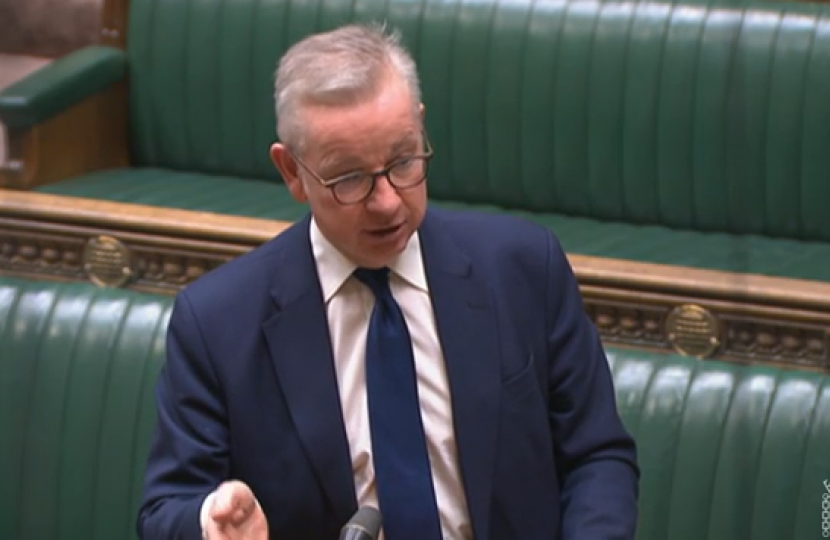
With your permission, Mr Deputy Speaker, I should like to make a statement that allows me to update the House on the Government’s progress in making buildings safe. It is a basic requirement of any civilised society that people should feel safe in their own homes, but for too many people for far too long, that has not been the case. As I have said before, so I say again: this has been a collective failure. Those in government who made the rules did not make them clear enough. Those who built our homes did not build them well enough. Those who made the materials that contributed to the construction of those homes often made them unsafe; at times, knowingly so. Those who were to check the work undertaken did not always check thoroughly enough. Of course, those who own the buildings have sometimes managed them so poorly that people have been left unsafe, and too many of those owners have still shirked their obligations to make people safe.
The only party to the crisis who do not share in the responsibility are the blameless leaseholders and the tenants who live in those buildings. That is why it is right that this Parliament protected those leaseholders through the Building Safety Act 2022 and apportioned financial responsibility more fairly. We continue to work to ensure that those who bear the blame for the crisis also shoulder the burden of putting the situation right.
We have made significant progress. Those who put unsafe material on people’s homes must now pay, instead of the innocent residents living in them. Leaseholders need no longer fear financial ruin simply to make their homes safe, and the major mortgage lenders, thanks to their confidence in our new approach, will now lend on properties that are covered by the leaseholder protections in the Building Safety Act. Of course, they will also lend where the building is eligible for a Government or developer remediation scheme. Leaseholders are no longer hostages to their mortgage arrangements.
We have also reopened and turbocharged the building safety fund for new applications and are piloting our medium-rise fund, paid for from a levy on developers, to ensure that dangerous cladding will be removed. Leaseholders can rest assured that their buildings will be made safe. Where remediation is required and building owners are sitting on their hands—even when money is being provided by the Government—we will use powers under the Act to force the owners to fix their unsafe buildings. Members should be in no doubt that there will be significant consequences for those who fail to comply with their legal obligations.
Leaseholders should know that the law is on their side. Today, we make further progress on delivery. In April last year, I announced that the largest house builders had signed a pledge committing to fix all life-critical fire safety issues, internal and external, in buildings over 11 metres that they had a role in developing or refurbishing in England. Developers also committed to reimbursing the taxpayer where that work has already been done and subsidised by the taxpayer. In the summer, my Department published the draft contract that will bind developers to honour that pledge. Since then, my officials have been working through that contract line by line to ensure that it codifies the pledge in a way that is fair and transparent, committing developers to fixing buildings for which they are responsible as swiftly as possible and therefore keeping residents and leaseholders informed about that work. I am grateful to all the developers who work with us and to the Home Builders Federation and its chairman, Stewart Baseley, who have worked so hard in order to ensure that this contract can deliver. Today, we are publishing the final contract that I expect housing developers to sign. A copy of the contract has been deposited in the Library of each House and it is available on gov.uk.
Let me be clear: if you are one of the developers we invited to submit comments on the contract, I now expect you to sign it within the next six weeks—by 13 March. That includes every company who signed the original pledge as well as several companies who have regrettably not done so. Now is the time for all of them to make a binding commitment that will not only see them doing right by those whose homes they have blighted, but help them to maintain their credibility with those who may seek to contract with them or who may consider buying their homes in future. Those who fail to step up and make this commitment will suffer the consequences that this Parliament has so clearly spelled out.
Using powers provided by the Building Safety Act, I will lay regulations this spring to create a new responsible actors scheme. Those regulations will set out which developers, by signing the contract, will be eligible to be members. We expect those who built unsafe buildings to sign the contract. To join the scheme, they will have to sign and comply with the terms of the contract published today. Of course, we will invite developers to join the scheme in order to ensure that we do right by leaseholders.
Anyone who fails to sign the contract will be prohibited from carrying out future development and from receiving building control sign-offs for buildings under construction. A developer who fails to sign this contract will have to find another line of work. I say to all developers who have built unsafe buildings over 11 metres, “I am putting you on notice. You will be asked to step up.”
I will consult in due course on how we expand the responsible actors scheme to make sure that we capture all those who built unsafe buildings and should now fix them. Altogether, I expect developer remediation to be worth more than £2 billion of investment in safety and to protect people in hundreds of buildings. I am grateful to those in the development community who have got on with assessing and remediating their buildings without waiting for the final form of contract; I welcome their constructive engagement.
All developers should recognise that in signing the contract, they are taking a big step towards restoring confidence in the construction sector and providing much-needed certainty to all concerned. Those who sign will confirm that they are responsible companies.
I know from the positive discussions that I have had that many are now keen to sign; I particularly thank all those developers who have today confirmed that they will sign. Accepting their new responsibilities will allow developers to plan ahead in the knowledge that they now understand the full extent of their legal obligations.
When these buildings are safe and a full reckoning has been made, we can then look to the future with a new clarity and confidence in our construction sector, but until that point, my determination will be to ensure that buildings are fixed, to do what we must all do to achieve that, and not to waver. My Department has a recovery strategy unit, which is relentlessly targeting those who have consistently failed to do the right thing. As well as targeting developers, it has also begun legal action against recalcitrant freeholders. It has active investigations under way into the conduct of various companies, including contractors and construction product manufacturers that bear responsibility for this crisis.
Let me again be clear to freeholders, from this Dispatch Box: if you are holding back work to make buildings safe, even where the Government have made sufficient money directly available to you through the building safety fund, you must fix your buildings or we will take action, including through the courts. To those freeholders who are trying to bully leaseholders into paying service charges that the Building Safety Act has already proscribed, let me spell out the law. Invoices issued before the Act came into force must be scrapped. New bills must comply with the law, including our new leaseholder protections.
While buildings await remediation, I know that many leaseholders continue to suffer spiralling insurance bills. Last year, I asked the Financial Conduct Authority to investigate the market. The serious issues that it uncovered concerned me greatly. It is simply unacceptable for managing agents, landlords and freeholders to profit from commissions secured out of the pockets of innocent leaseholders as bills spiral, so I can confirm today that I will take action to ban property managing agents, landlords and freeholders from receiving commissions and other such payments from insurers and brokers, replacing them with more transparent fees.
I will not permit people to hide charges in obscure invoices; I will require service charges to be issued to leaseholders transparently with clearly labelled statements. I will not allow building owners and landlords to charge their leaseholders to pay for their own legal bills, even to pay for settlements when leaseholders win their cases. Together, these steps will ensure that leaseholder insurance costs are fairer and more transparent, and they will empower leaseholders to challenge dodgy bills. I am also pleased to see that the FCA has committed to investigate broker practices and to consult on further regulatory changes to protect and empower leaseholders.
Leaseholders also now need insurance premiums to be reduced significantly—and urgently—so I expect the FCA to report on what further actions it will take to ensure that there is a fairer and more competitive market by the summer, and to continue its monitoring of this sector. I welcome work from within the insurance industry on launching a UK-wide scheme to reduce the most severe premiums for leaseholders and buildings with fire safety issues, but I must stress the urgency of this work: leaseholders need support now.
As we right the wrongs of the past, we must ensure that we can say with confidence that the future will be better. We want a culture of high standards that will transform not only the attitudes of people working in the construction sector but, ultimately, our whole built environment. Working together, we can put standards and safety first, and that means listening to the tenants and leaseholders who have suffered so much. Their experience is what matters, and their views must be at the heart of our approach. When everyone’s interest is aligned with the interests of tenants and leaseholders, everyone will benefit in the long run.
Government must play their part through clear regulation, but also through leadership that holds current wrongdoers to account. The new building safety regulator that we have established will oversee a culture of higher standards, and over the coming year my ministerial team and I will present an ambitious programme of secondary legislation to set the regulator on firmer foundations. Building owners and managers should already be preparing for the first requirement, due to come into force soon—the requirement to register higher-risk buildings with the regulator.
In the last year, we have made significant progress. When we were told that there was an impasse, we managed collectively in the House to break through. When we were told that leaseholders must pay, we ensured that they were protected; we were told that developers would never pay, but billions of pounds are now being pledged by developers to help those in their buildings. That demonstrates what can be achieved when people accept responsibility in a spirit of good will and collective endeavour. While there is much more to do, today is a major step forward, and I commend this statement to the House.

